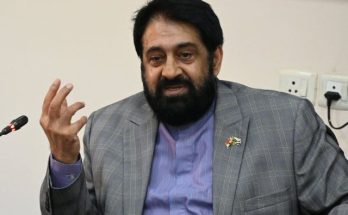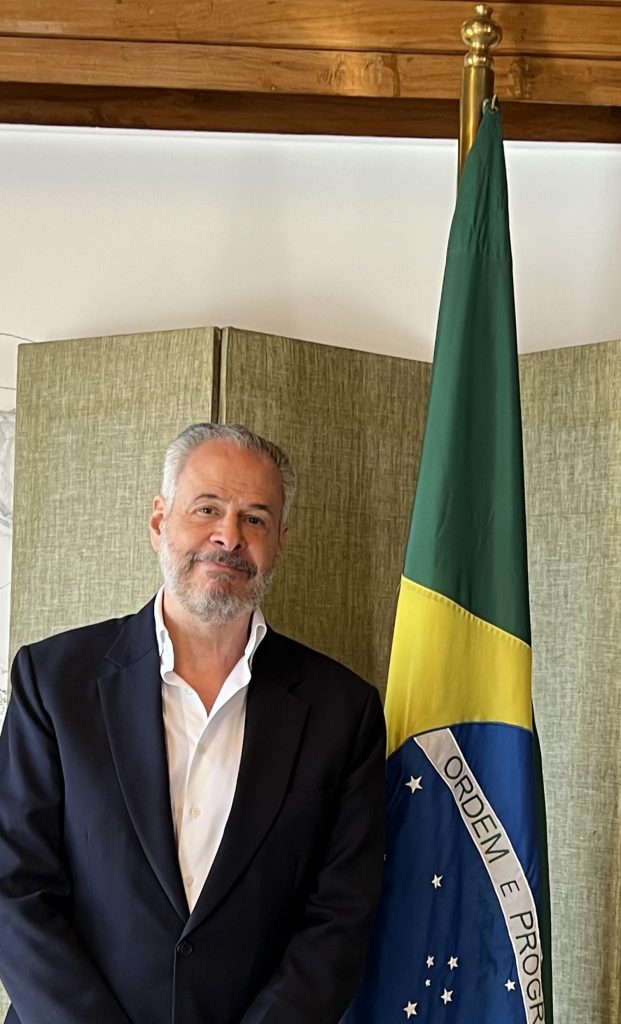
India’s G20 presidency has ignited hopes about a new period of the leadership of emerging economies in the 20-nation grouping. In this interview, André Aranha Corrêa do Lago, Brazil’s Ambassador to India, speaks to Manish Chand, Editor-in-Chief, India and The World and Director, Centre for Global India Insights (CGII), on Brazil’s views on how India can promote the interests of the Global South and emerging economies in G20. A renowned architect critic and writer, Mr do Lago is also upbeat about the future trajectory of India-Brazil partnership under President Lula, who will be officially sworn in on January 1.
(Excerpts from the interview)
Q) What does Brazil expect from India’s G20 presidency? Do you think issues of the South need greater prominence in the G20 agenda?
A) First of all, it is a unique opportunity to have successive G20 presidencies of Indonesia, India, Brazil, and South Africa (2022-2025). IBSA countries will preside over G20 for three years. The three countries have many priorities in common. What is important is that we do not want to use the South-South dimension to point to the problem, but to point to alternative solution. Sustainable development and curbing climate change – the issues that India has been stressing for the G20 presidency are totally in line with the priorities of Brazil.
The world was divided between developed and developing countries on these issues. But now, all countries are behaving. If you look at it objectively, the developed countries do not have high marks in all the SDGs. Of the 17 SDGs, most developed countries only have good marks in seven or six of them. The great progress we have achieved with the SDGs and the 2030 agenda is that in the fight against climate change, we are really in it together; we are not divided anymore among developed and developing countries.
Q) India has firmed up a multifaceted agenda for G20, focusing on issues like sustainable development, SDG, green development, digital transformation and digital technologies. How do you see all this fitting together to produce transformative outcomes?
A) The world is in the midst of crises. in this context, Indonesia had a very important role in chairing the G20 in the middle of a host of crises. Now, India has already shown how constructive it wants to be because India, in this policy regarding the case of the war in Ukraine, or other subjects, has always been an example to the world.
India has more than 4000 years of civilization, which people sometime forget. So, India has a different perspective on big issues because it looks at these issues from a long-term perspective. This is the contribution the world will understand very well after this G20.
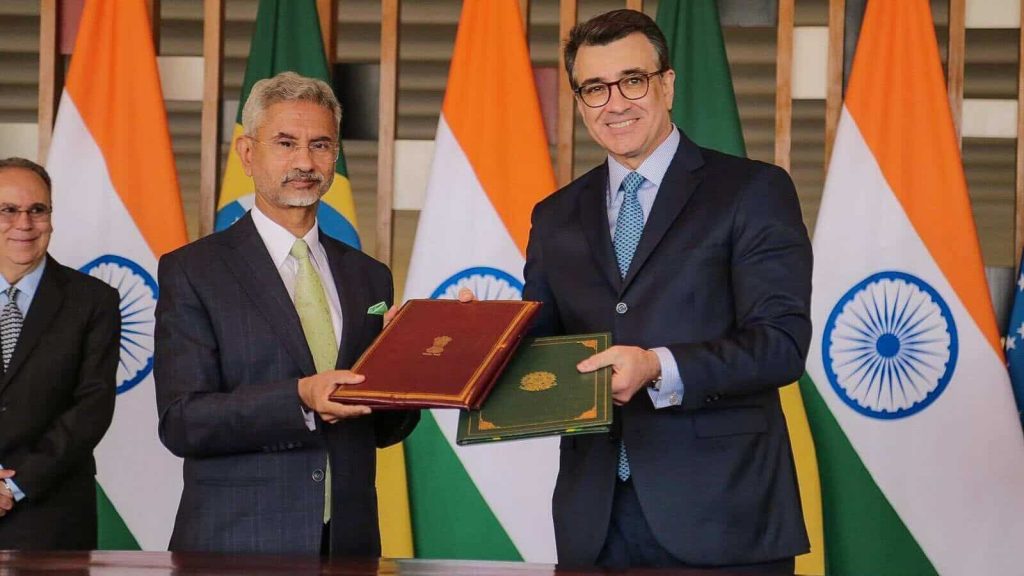
Let’s not forget that India was the first or the second largest economy in the world for hundreds of years. Only for two-and-a-half centuries, India has gone down in its international relevance as an economy. So, the natural position of India is to be ahead of others. That is why I totally agree when people say that there are emerging countries and re-emerging countries. China and India are re-emerging countries because they were the two largest economies for literally thousands of years. This position of India as a country that has a very special status in world history is going to be very clear after this G20. India has an international standing now, that is very compatible with its historic relevance.
Q) Another issue which unites India and Brazil is the reform of multilateral institutions. Both India and Brazil are aspiring candidates of the United Nations Security Council. How do you see the way forward on this crucial issue?
A) The message of the non-G7 countries has been very clear. BRICS, IBSA and the G4 were somehow all very clear signs that things must change in the international structure of multilateralism. The great danger that we may face is to demonize the multilateral system — when that is not the message. The message is that we have to democratize the multilateral system and make it more efficient and make it more representative of the world’s population. India has all the conditions and credentials to do that. In digitalization, India has completely changed the agenda.
Many people think India is fighting for food security. This may have been true decades ago, but India is now successfully using many technological advances to leapfrog. India, in many ways, is an example to the rest of the world. India still has inequality like Brazil; India still has lots of people that need better services. But India is rapidly progressing and using technology to transform people’s lives. India is proving anything is possible and it is this combination of attitude and expertise India is bringing to the G20.
Q) India will be hosting the G20 summit on September 9-10, 2023. When can we expect President Lula? Will President Lula come to India for the summit?
A) President Lula will arrive on September 9 because we will celebrate the National Day on September 7. So, he will only be able to leave Brazil after that. President Lula is starting his new presidential tenure on January 1. One can expect a very intense agenda and a crucial change of priorities. President Lula has clearly stated that he wants to be the President of all Brazilians.
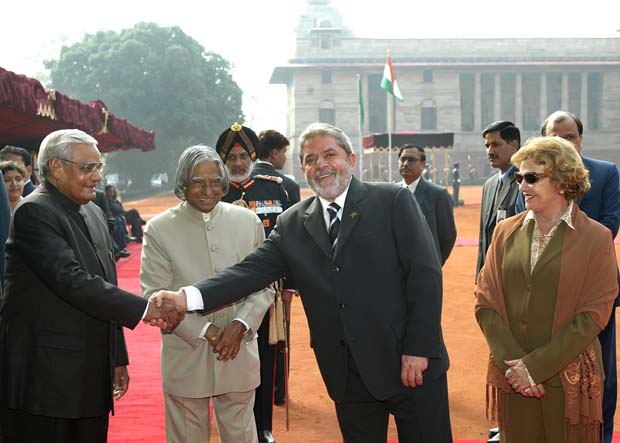
Q) Brazil’s new President is known to be a great friend of India. How will India-Brazil relations progress under President Lula?
A) President Lula has a very deep personal connection with India and will strengthen India-Brazil relationship even more. And so we are looking forward to see this natural partnership to be more clearly understood by the general public and translate into investments, trade, science and technology and close cultural and people-to-people ties.
It’s important to remember that it was under President Lula that we established the strategic partnership between India and Brazil. This strategic partnership has evolved positively. India is now the fifth largest trade partner of Brazil, and Brazil is the eighth largest trade partner of India. Indian investments in Brazil are increasing.
Q) Going forward, what will be major focus areas of growth in India-Brazil partnership, especially in the defence sector.
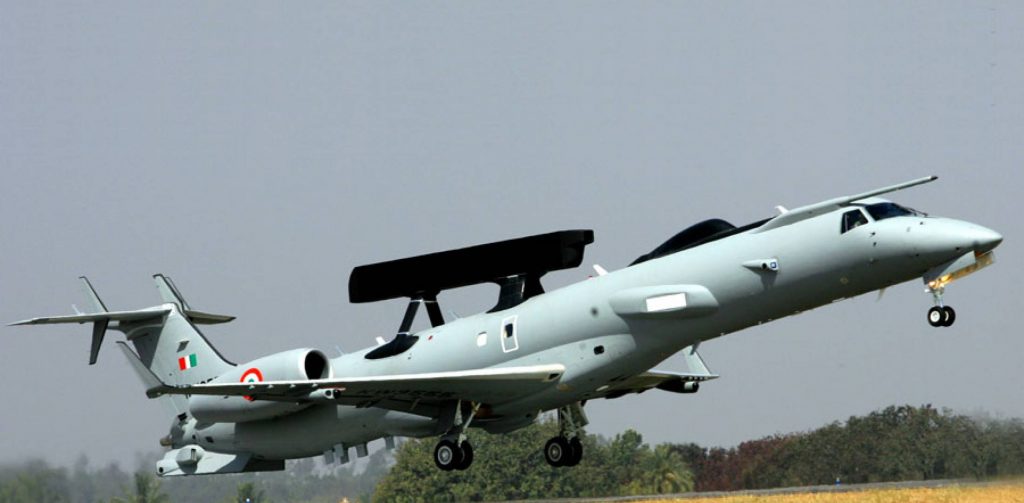
A) I wish to stress that the Brazil-India relationship is a state policy; it’s not a government policy. There is an across-the-board consensus in Brazil about strengthening India-Brazil relationship. India is probably the most important market for Brazil’s defence equipment. In aviation, there is tremendous potential for growth and Embraer has a very important role to play in India. Embraer today is the third largest airplane builder after Boeing and Airbus. Embraer has some products that are really particularly compatible with the priorities of India.
It’s also important for India to understand the new role that Brazil has in the global oil market because Brazil now is the seventh largest exporter of oil, and soon will be the fifth. India and Brazil will expand cooperation in the oil sector. We also need to strengthen people-to-people relations, which will really make a huge difference to overall relationship.
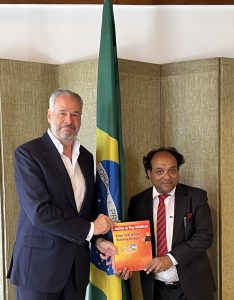
(Manish Chand is CEO-Editor-in-Chief, India Writes Network, and India and The World magazine. He is Director, Centre for Global Insights India, a think tank focused on global affairs)
Author Profile

- Manish Chand is Founder and Editor-in-Chief of India Writes Network (www.indiawrites.org) and India and World, a pioneering magazine focused on international affairs. He is CEO, Centre for Global India Insights, an India-based think tank focused on global affairs.
Latest entries
 India and the WorldFebruary 17, 2026South-by-South: Focus on people-centric solutions at India AI summit
India and the WorldFebruary 17, 2026South-by-South: Focus on people-centric solutions at India AI summit India and the WorldFebruary 7, 2026Modi hails interim India-US trade deal, Goyal says no concessions made on agriculture
India and the WorldFebruary 7, 2026Modi hails interim India-US trade deal, Goyal says no concessions made on agriculture India and the WorldFebruary 2, 2026Trump announces trade deal with India, Modi ‘delighted’
India and the WorldFebruary 2, 2026Trump announces trade deal with India, Modi ‘delighted’ India and the WorldJanuary 31, 2026Palestinian minister bats for mediatory role for India in ending Gaza conflict
India and the WorldJanuary 31, 2026Palestinian minister bats for mediatory role for India in ending Gaza conflict





